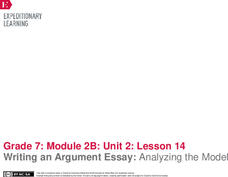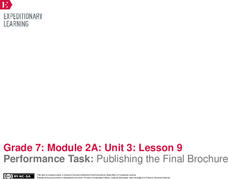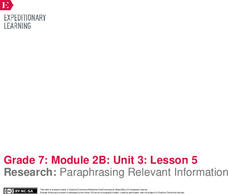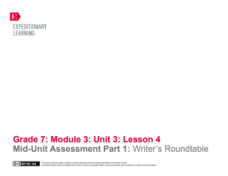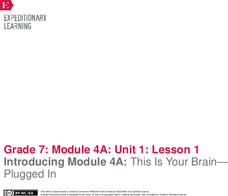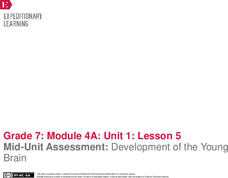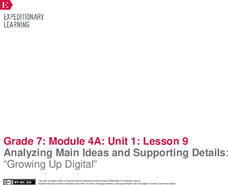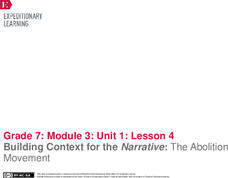EngageNY
Writing an Argument Essay: Introducing the Writing Prompt and Model Essay
Scholars take a look at the difference between explanatory and argumentative essays by completing graphic organizers. They then determine how this difference applies to the Pygmalion writing prompt. Learners keep track of their writing...
EngageNY
Writing an Argument Essay: Analyzing the Model
Class members analyze the model essay to determine the given claim and the evidence to support it. They use an Analyzing Evidence in the Model Essay sheet to help guide their work. They then begin to analyze the structure of the essay by...
EngageNY
Performance Task: Publishing the Final Brochure
Add your final touches! Seventh graders finish the final draft of the brochure they began in the previous lesson. They then reflect by talking with other learners to discuss their work. Peers talk about the choices they made in layout as...
EngageNY
End of Unit 2 Assessment, Part 1: Drafting the Essay
Young writers use the class time to complete a draft argumentative essay. In answer to the Pygmalion end-of-unit prompt they discuss the change seen in Eliza's inner identity.
EngageNY
Writing the Argument Essay: Moving from Planner to Drafting
It's an easy transition. Scholars identify transition words in the Pygmalion model essay and record definitions in the Transitions anchor chart. They then begin to look at the tone of the model essay. Finally, individuals begin writing...
EngageNY
End of Unit Assessment, Part 2: Revise Essay Drafts
And now for the grand finale! Scholars prepare their final Pygmalion end-of-unit essays. Learners participate in a brief mini lesson plan about correcting errors and then begin revising their own argumentative essays.
EngageNY
Gender and Pygmalion
Scholars take a close look at the role of gender presented in Pygmalion. They work in pairs to complete Gender Excerpts and Text-Dependent Questions. To finish, classmates discuss the role gender plays in the United States today.
EngageNY
Introducing the Research Project: Asking the Right Questions
Road trip! Scholars take a look at a researcher's roadmap as they begin discussing the research process. They view the research performance task portion about Pygmalion, and then hunt for research process cards hidden under chairs....
EngageNY
Research: Paraphrasing Relevant Information
Young writers practice paraphrasing information from Truth in Advertising? They keep an eye out for examples of false advertising as they read, recording ideas and information in their researcher's notebook along the way.
EngageNY
End of Unit Assessment: Research Synthesis
Writers near the end of the unit and begin working on the end-of-unit assessment. They analyze the prompt and a model performance task. The class then begins creating a rubric for the assessment by writing bullet points from their think...
EngageNY
Planning the Performance Task
Class members work in pairs and use an Ad Analysis planning guide to begin planning their final tasks. After sharing ideas with their partners, learners begin working on their final products.
EngageNY
Performance Task: Write Ad Analysis
It's final. Scholars work on their final drafts of their ad analyses. They use the model sample Samsung Appliances for reference. After completing the task, learners turn and talk with one another about the decisions they made in...
EngageNY
Performance Task: Create a Counter Ad
Do a 360. After completing their ad analyses, scholars now begin working on their counter ads. Once again, they use the model performance task for reference and guidance. When finished, pupils talk with one another about their work.
EngageNY
Analyzing Character: Eliza Character Pyramid
Building a pyramid is not as hard as it looks! Scholars analyze the character of Eliza in Pygmalion by crafting a character pyramid about her. After discussing a model pyramid, pupils receive a blank Eliza Doolittle Character...
EngageNY
Mid-Unit Assessment Part 1: Writer’s Roundtable
Hear ye, hear ye, it's time for a writer's roundtable! Scholars clarify their thinking about their narrative writing project by engaging in a fishbowl discussion about their plans. As members within the inner circle discuss the topic,...
EngageNY
Preparing for the Mid-Unit Assessment: Planning the Children’s Book
Pupils complete a My Children's Book Plan worksheet to carefully prepare for a narrative writing project. Scholars also continue working in their groups from lesson plan two, using their scavenger hunt worksheets to discuss what makes a...
EngageNY
Introducing Module 4A: This Is Your Brain—Plugged In
What does brain science reveal about teens and decision making? Scholars watch a short video and participate in a gallery walk to pique their interest and curiosity about the topic. Next, they begin reading an informational article about...
EngageNY
Comparing Text to Multimedia: Understanding How the Brain Changes
Learners explore how the human brain changes over time, comparing an interactive web page about brain development to a text-only version. Additionally, pupils continue reading an article about teen decision making, analyzing the main...
EngageNY
Analyzing the Main Idea in Video: Understanding the Limbic System
It's time to put on those thinking caps and analyze the brain! Pupils watch a video about teenage brain development, using a note-catcher to capture their thoughts about the main idea. Finally, they select two pieces of information from...
EngageNY
Mid-Unit Assessment: Development of the Young Brain
Scholars view a video clip about adolescent brain development and work with partners to identify the main idea and supporting details. Next, as part of the mid-unit assessment, pupils watch another clip from the video and complete a main...
EngageNY
Analyzing Main Ideas and Supporting Details: “Growing Up Digital”
Young scholars continue their exploration of adolescent brain development by reading an informational text, "Growing Up Digital," by Matt Richtel. Then, with partners, they complete note-catcher worksheets to capture the article's main...
EngageNY
Building Context for the Narrative: The Abolition Movement
That's history. Scholars work together to review the text Abolition and its accompanying text-dependent questions. They then determine what information to add to the Historical Context anchor chart. For homework, individuals think...
EngageNY
Analyzing Douglass’s Purpose
Class members continue analyzing text excerpts from Narrative of the Life of Frederick
Douglass. They read and draw conclusions to determine Douglass's view on slavery. Learners finish by discussing with partners how the excerpts...
EngageNY
Close Reading Excerpt 2: Plantation Life
Time for a good old fashioned match game! Readers complete an initial, second, and third read of Plantation Life to gain a deep understanding. After close reading the text, scholars practice identifying paraphrasing by...



